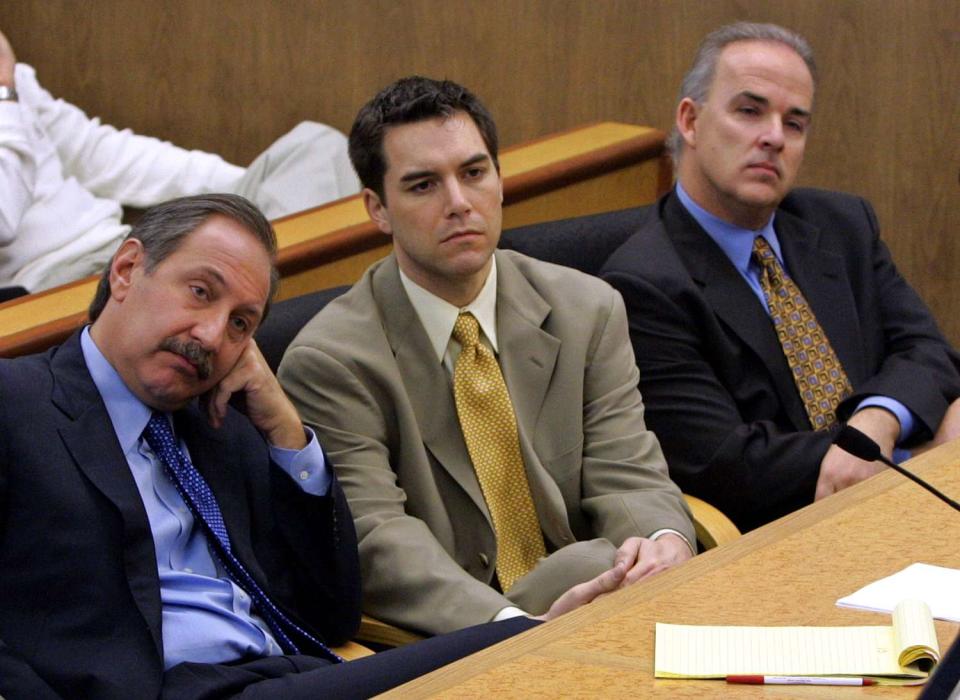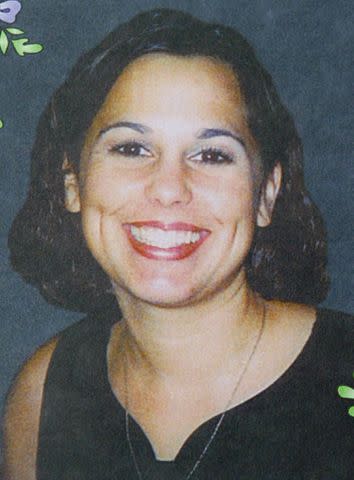Here Was Scott Peterson's Defense at His 2004 Murder Trial in Death of Pregnant Wife Laci
The L.A. Innocence Project is representing Scott Peterson nearly two decades after he was convicted of murdering his pregnant wife Laci and their unborn child

He was an adulterer but not a murderer — and the prosecution pieced together a circumstantial narrative because law enforcement was fixated on him as a suspect.
This was the heart of Scott Peterson’s defense when he stood trial for murder in 2004 in connection with the death of his wife, Laci Peterson, and the couple's unborn child, who they planned to name Conner.
Laci, 27, was eight months pregnant with Conner when authorities said she vanished on Christmas Eve in 2002, five years after she and Scott had married. Her husband soon became the prime suspect after it was revealed he was having an affair with a woman who said she did not know he was married.
Four months later, Laci's body was found in San Francisco Bay, a mile away from where her unborn baby's remains were found.
Scott claimed that Laci was killed as she walked the couple’s dog after he left to go on a solo fishing trip on Christmas Eve morning.
This week, almost two decades after Scott was found guilty of two counts of murder, the L.A. Innocence Project took up his case, saying new evidence bolstered his claim that he's not guilty.
PEOPLE has reached out to Scott’s defense attorney Pat Harris, who said in a statement obtained by CBS News: “We are very excited to have the incredible attorneys at the L.A. Innocence Project lend their considerable expertise to helping prove Scott Peter’s Innocence."

Justin Sullivan/Getty Images
During the highly-publicized trial, Scott's defense team repeatedly cast doubt on claims made by prosecutors. Scott’s lawyer Mark Geragos claimed to jurors that prosecutors primarily relied on circumstantial evidence and had "zero, zip, nada, nothing" of forensic evidence, Court TV News reported in 2009. The forensic evidence that the prosecution did produce was disputed by the defense.
Here is an outline of Scott's defense during his 2004 trial in San Mateo County, Calif.
Absence of Direct Evidence — and Laser Focus on Scott
Scott's defense attorneys noted that the prosecution’s case relied on a narrative of circumstantial evidence, and that there were no witnesses, no murder weapon, and no evidence of a struggle that led to Laci’s death.
Instead, they said law enforcement had been laser-focused on him because of his affair.
Scott's attorney, Mark Geragos, suggested that Laci had possibly been kidnapped by burglars or one or homeless people who frequented a park near the Peterson home, the San Francisco Chronicle reported at the time.
But, said Geragos, law enforcement’s intense focus on Scott led them to fail to pursue other potential suspects or follow other leads.
"If you presume this guy is guilty, you can put a sinister spin on anything," Geragos said during closing arguments, The New York Times reported.
Scott's Alibi: He’d Gone Fishing
Scott told police he’d gone on a solo fishing trip on Dec. 24, 2002, in San Francisco Bay — near where Laci’s body was later found — and then came back to find his wife missing. Scott's lawyers asserted that someone else abducted Laci during the time she was walking the dog and killed her.
The AP reported at the time that when police questioned Scott after Laci’s disappearance, he produced a parking receipt from a marina in Berkeley.
However, Laci’s sister Amy Rocha testified in court that Scott told her on Dec. 23 that he planned to go golfing in Modesto, which prosecutors said undermined his claim that he was fishing, CBS News reported at the time.
Scott told police he’d been trying to catch sturgeon, but prosecutors, saying that Scott brought only artificial lures instead of live bait, called an expert fisherman who said knowledgeable anglers would know to use live bait.
Scott, however, had told police that he was less concerned with catching fish than using the boat he’d recently purchased.
Scott Wanted a Baby, and Didn’t Have a Financial Motive
Prosecutors contended Scott didn’t want a baby, but his attorneys said this could not have been more untrue. Scott's defense noted that he had designed the baby’s nursery with a nautical theme, and that he accompanied Laci to all of her doctor’s appointments, NBC reported at the time.
Defense attorneys also took issue with the prosecution’s suggestion that Scott had a financial motive. They pointed out that Laci stood to inherit nearly $1 million, sand said Scott stood to gain more if Laci were alive, The New York Times reported.
"There was no motive for him to kill Laci and Conner whatsoever," Geragos said during closing arguments. "In fact, on the contrary."
Defense Admits Scott Is Adulterer — But Not Murderer
Geragos acknowledged in his closing argument that Scott had been unfaithful to Laci, and that it would be reasonable for jurors to view him as a “jerk and a liar.”
But, he said, that didn’t make him a murderer.
"If you hate him, then maybe what they're asking you to do is just convict him. Don't bother with the five months of evidence,” he told the jury during closing arguments, CBS reported at the time.
“Don't bother with the fact that the evidence shows clearly that he didn't do this and had absolutely no motive to do this," he added.
Martha Stewart — and Laci's Whereabouts on Dec. 24
Prosecutors challenged Scott's claim that Laci was watching TV before leaving to walk the dog on the morning she disappeared, according to a 2004 TIME report. After Scott told investigators Laci was watching a show featuring Martha Stewart baking meringues, prosecutors stated there was no such segment on that day's show.
But during the trial, Geragos played video for the jurors showing the lifestyle guru whipping up baked meringues. And when prosecutors argued that Laci was too tired to walk with the dog, Geragos countered with evidence that she went to a spa and bought $100 worth of groceries that morning.
Did Laci Know About Scott's Boat?
Prosecutors alleged that Scott bought a boat without Laci's knowledge weeks before her killing because he planned to use the boat to dispose of her body, according to NBC 9News. But on cross-examination, a police detective said he “excised” from the police report an interview with a woman who said she saw Laci using the bathroom at Scott’s warehouse, where the boat was stored, the day before her disappearance. This testimony would have played a crucial role in debunking the prosecution’s claim that Laci was not was aware of Scott’s boat.
Related: The Peterson Case: How They Got Scott
Laci's Hair Found on Scott's Boat — But Did Police Mishandle Evidence?
Prosecutors claimed that, after killing his wife, Scott loaded Laci's body onto the boat and dumped the body in San Francisco Bay. To establish a link between the boat and the dead woman, the prosecution presented hair strands allegedly belonging to Laci found on the boat, and DNA from a pair of pliers that matched Laci’s DNA, NBC News reported.
But Scott's defense attorneys cast doubt on the police's handling of evidence, pointing out that investigators initially claimed they collected one strand of hair on the boat and then said there were actually two strands, according to CBS News. Under cross-examination, a state criminalist admitted the pliers found on the boat had no blood or tissue on them but were rusty, suggesting they hadn't been used recently.
Attacking Prosecution's Claim About Cement Anchors
Prosecutors claimed Scott built four concrete anchors that he then attached to Laci to ensure her body would sink below the surface after he threw it from his boat, according to NBC News. During the investigation, Scott told investigators that he had built only one anchor and had used the excess cement to repair his driveway, per the outlet.
At trial, his defense team presented an engineer and concrete expert who testified that the cement used to make the anchor was a match with cement found in Scott's driveway, undermining the prosecution's claim that he had used all the cement to build multiple anchors. And only one anchor was ever recovered, per NBC News.
For more People news, make sure to sign up for our newsletter!
Read the original article on People.

